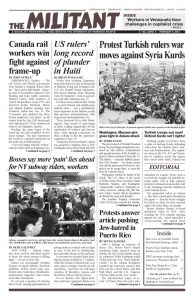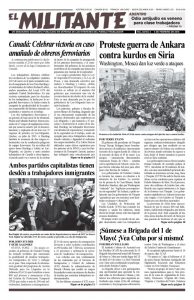NEW YORK — “Puerto Rico has been in crisis since the 1970s, but it has gotten worse since 2006” when the worldwide capitalist economic crisis deepened, Edwin Morales Laboy, vice president of the Puerto Rico Teachers Federation, said at a citywide public meeting at the New York State Nurses Association center Jan. 20.
The anti-working-class measures adopted by the Puerto Rican government include a wage freeze and layoffs of public workers, tearing up of union contracts, school closings and slashing of pensions. Morales and Federation President Mercedes Martínez spoke at the event, concluding a four-day speaking tour organized by A Call to Action on Puerto Rico, which builds support in the U.S. for independence of the U.S. colony.
The two union leaders also spoke at the Cornerstone Academy for Social Action in the Bronx, a public school; at CUNY Graduate Center; and on a panel with Camilo Matos of the Puerto Rico Nationalist Party and Seth Galinsky from the Socialist Workers Party at a Militant Labor Forum on the fight against colonial rule.
The attacks on workers accelerated with President Barack Obama’s appointment of the Financial Oversight and Management Board for Puerto Rico in August 2016, which was given dictatorial control over the government’s finances and tasked with maximizing payment to bondholders on the island’s $74 billion debt.
Between Washington’s board and the island’s capitalist government, “we are dealing with a monster,” Morales said.
“In response, we saw a rise in class struggle last year,” he said, pointing to a 72-day strike by students against the board’s demand to cut $500 million from the University of Puerto Rico budget and tuition hikes and other actions.
On May 1, tens of thousands of people marched in San Juan to oppose the attacks on working people and youth. Thousands more joined a general strike across the island that day.
Then Hurricane Maria ravaged the country. “For one month there was no government,” he said. “People were on their own, and communities had to self-organize to get basic necessities. Working people have become disillusioned with the two main political parties.”
Even after the storm “the fiscal board continues on the same path, imposing an illegal, immoral debt,” Morales said. “It’s part of the empire, of the more than 100 years of exploitation and colonialism. We need to build a new economic model.”
The Teachers Federation was the recognized union in public schools until 2008, explained President Martínez. That year more than 40,000 teachers went on strike to block moves to privatize schools and take away hard-won benefits. The government said the strike was illegal and decertified the union.
“We lost our certification, but we won one of our central demands,” Martínez said. “They still have not been able to privatize a single public school.”
At the beginning of 2017, Gov. Ricardo Rosselló appointed Julia Keleher, a business professor at George Washington University in Washington, D.C., as secretary of education. Keleher’s attempts to shut down hundreds of public schools have led to numerous protests organized by the federation.
Martínez played videos of news interviews with Keleher, where she claimed that teachers and parents can protest and demonstrate all they want “but it won’t have an impact.”
Nonetheless “our protests were able to stop more than half the closings,” Martínez said.
After the hurricane damaged hundreds of schools, the union joined with parents and other volunteers, she said, and “we cleaned and repaired the schools so they could reopen. We got no help from the government.”
When asked about the offer by revolutionary Cuba to send brigades of electrical workers to help restore power along with a mobile hospital and doctors, Morales said that many working people know about the offer.
“Cuba has always been an ally of the people of Puerto Rico,” he said. “And though Cuba has less resources, they resolved the damage after the hurricane there quickly. There is a lot we have to learn from them.”

